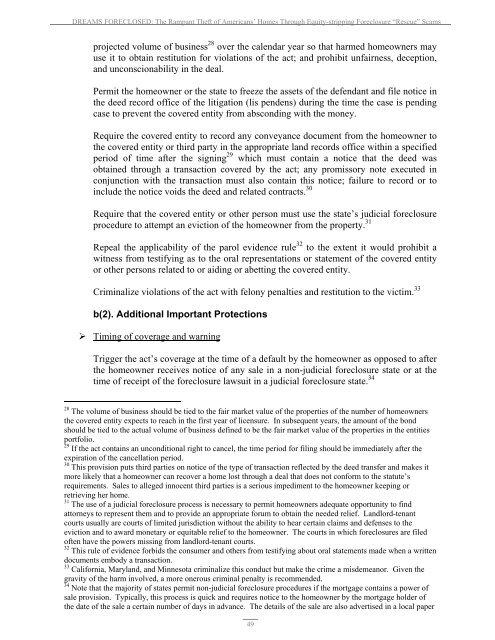DREAMS FORECLOSED: The Rampant Theft of Americans' Homes
DREAMS FORECLOSED: The Rampant Theft of Americans' Homes
DREAMS FORECLOSED: The Rampant Theft of Americans' Homes
You also want an ePaper? Increase the reach of your titles
YUMPU automatically turns print PDFs into web optimized ePapers that Google loves.
<strong>DREAMS</strong> <strong>FORECLOSED</strong>: <strong>The</strong> <strong>Rampant</strong> <strong>The</strong>ft <strong>of</strong> Americans’ <strong>Homes</strong> Through Equity-stripping Foreclosure “Rescue” Scams<br />
projected volume <strong>of</strong> business 28 over the calendar year so that harmed homeowners may<br />
use it to obtain restitution for violations <strong>of</strong> the act; and prohibit unfairness, deception,<br />
and unconscionability in the deal.<br />
Permit the homeowner or the state to freeze the assets <strong>of</strong> the defendant and file notice in<br />
the deed record <strong>of</strong>fice <strong>of</strong> the litigation (lis pendens) during the time the case is pending<br />
case to prevent the covered entity from absconding with the money.<br />
Require the covered entity to record any conveyance document from the homeowner to<br />
the covered entity or third party in the appropriate land records <strong>of</strong>fice within a specified<br />
period <strong>of</strong> time after the signing 29 which must contain a notice that the deed was<br />
obtained through a transaction covered by the act; any promissory note executed in<br />
conjunction with the transaction must also contain this notice; failure to record or to<br />
include the notice voids the deed and related contracts. 30<br />
Require that the covered entity or other person must use the state’s judicial foreclosure<br />
procedure to attempt an eviction <strong>of</strong> the homeowner from the property. 31<br />
Repeal the applicability <strong>of</strong> the parol evidence rule 32 to the extent it would prohibit a<br />
witness from testifying as to the oral representations or statement <strong>of</strong> the covered entity<br />
or other persons related to or aiding or abetting the covered entity.<br />
Criminalize violations <strong>of</strong> the act with felony penalties and restitution to the victim. 33<br />
b(2). Additional Important Protections<br />
‣ Timing <strong>of</strong> coverage and warning<br />
Trigger the act’s coverage at the time <strong>of</strong> a default by the homeowner as opposed to after<br />
the homeowner receives notice <strong>of</strong> any sale in a non-judicial foreclosure state or at the<br />
time <strong>of</strong> receipt <strong>of</strong> the foreclosure lawsuit in a judicial foreclosure state. 34<br />
28 <strong>The</strong> volume <strong>of</strong> business should be tied to the fair market value <strong>of</strong> the properties <strong>of</strong> the number <strong>of</strong> homeowners<br />
the covered entity expects to reach in the first year <strong>of</strong> licensure. In subsequent years, the amount <strong>of</strong> the bond<br />
should be tied to the actual volume <strong>of</strong> business defined to be the fair market value <strong>of</strong> the properties in the entities<br />
portfolio.<br />
29 If the act contains an unconditional right to cancel, the time period for filing should be immediately after the<br />
expiration <strong>of</strong> the cancellation period.<br />
30 This provision puts third parties on notice <strong>of</strong> the type <strong>of</strong> transaction reflected by the deed transfer and makes it<br />
more likely that a homeowner can recover a home lost through a deal that does not conform to the statute’s<br />
requirements. Sales to alleged innocent third parties is a serious impediment to the homeowner keeping or<br />
retrieving her home.<br />
31 <strong>The</strong> use <strong>of</strong> a judicial foreclosure process is necessary to permit homeowners adequate opportunity to find<br />
attorneys to represent them and to provide an appropriate forum to obtain the needed relief. Landlord-tenant<br />
courts usually are courts <strong>of</strong> limited jurisdiction without the ability to hear certain claims and defenses to the<br />
eviction and to award monetary or equitable relief to the homeowner. <strong>The</strong> courts in which foreclosures are filed<br />
<strong>of</strong>ten have the powers missing from landlord-tenant courts.<br />
32 This rule <strong>of</strong> evidence forbids the consumer and others from testifying about oral statements made when a written<br />
documents embody a transaction.<br />
33 California, Maryland, and Minnesota criminalize this conduct but make the crime a misdemeanor. Given the<br />
gravity <strong>of</strong> the harm involved, a more onerous criminal penalty is recommended.<br />
34 Note that the majority <strong>of</strong> states permit non-judicial foreclosure procedures if the mortgage contains a power <strong>of</strong><br />
sale provision. Typically, this process is quick and requires notice to the homeowner by the mortgage holder <strong>of</strong><br />
the date <strong>of</strong> the sale a certain number <strong>of</strong> days in advance. <strong>The</strong> details <strong>of</strong> the sale are also advertised in a local paper<br />
49



